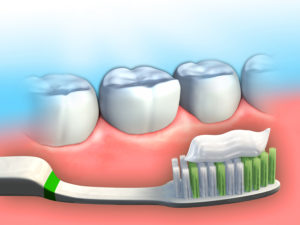
Not Brushing Long Enough
In order to thoroughly clean your teeth, you need to cover quite a bit of surface area. This means you should brush your teeth for about two minutes each time. Anything less than two minutes could leave behind leftover food particles and plaque.
Using an Old Toothbrush
An old toothbrush can irritate your gums and introduce bacteria into your mouth. Old brushes tend to have frayed bristles, which can damage the gingiva. They’re also ripe with bacteria.
The American Dental Association recommends switching brushes every three months. To help remember when to change out your brush, mark a calendar or dedicate a new toothbrush to each changing season. If you fall ill with a cold or the flu, change your brush out after you recover.
Vigorous Brushing
Although elbow grease can clean a counter top or bathtub, vigorous brushing will not improve the cleanliness of your teeth and gums. Brushing too hard will actually damage your tooth enamel – the protective coating around your teeth that helps prevent tooth decay.
Brushing your teeth in gentle circular motions is the best way to achieve a clean mouth.
Abrasive Toothpaste
Everyone wants a white smile but whitening toothpastes tend to be very abrasive. Rather than choose whitening toothpastes, opt for a professional whitening treatment from your dentist. Then, brush your teeth with a fluoridated toothpaste approved by the American Dental Association.
Improper Toothbrush Storage
The way you store your toothbrush could affect your oral hygiene. Your toothbrush should be stored upright in the open air to breathe between uses. Placing it in a drawer or in a closed container will keep it damp, which increases the growth of harmful bacteria.
If it’s time for a checkup or cleaning, call Kozlow & Rowell Dentistry to reserve an appointment with our dentist.